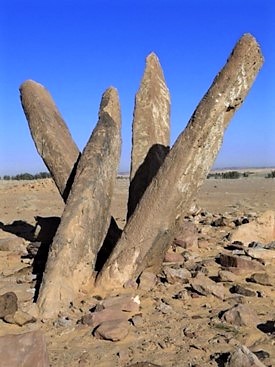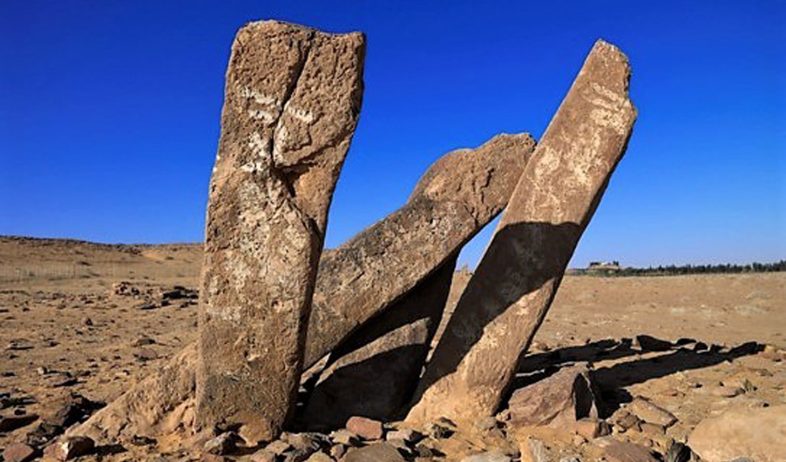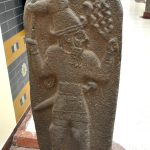In this major multi-purpose post we’ll be discussing:
1- The origin of certain ruling dynasties and royal titles as oracles and prophesiers in ancient temples,
2- Origin of stone rings or stone markers and carins as temples of oracles and designated ancient alters for sacrificial offerings,
3- Origin of stoning Satan in Islam (See article
The reason why three topics of what may be regarded as issues of critical significance are grouped in a single coverage is the surprising connection they have to a single mono syllabic root morpheme of Yemeni origin. The words etymologically considered include the following:
regal, royal, regalis, *reg, regalia, real, reality, realistic, royal, royalty, royalties, regimen, regere, reign, reigne, règne, Raj, rajah, Rajput, régime, regent, regimen. The main entries should also include all their known extensions of several dozens.
Let’s begin with reviewing the available origins of the following entries all from the Online Etymology Dictionary for quick reference:
►rajah (n), also raja, “king or prince in India,” 1550s, from Hindi, from Sanskrit rajan “king,” related to raj “kingdom, kingship,” rajati “he rules,” and cognate with Latin rex, Old Irish rig “king” (see regal). Related: Rajput, “member of the ruling caste in northern India” (1590s), from Sanskrit rajaputrah “prince,” literally “king’s son,” from putrah “son, boy” (seepuerile).
►real (n.) :”small Spanish silver coin,” 1580s, from Spanish real, noun use of real (adj.) “regal,” from Latin regalis “regal” (see regal).
►regal (adj.): late 14c., from Old French regal “royal” (12c.) or directly from Latin regalis “royal, kingly; of or belonging to a king, worthy of a king,” from rex (genitive regis) “king,” from PIE root *reg: “move in a straight line,” hence, “direct in a straight line, rule, guide” (cognates: Sanskrit raj: “a king, a leader;” Avestan razeyeiti “directs;” Persian rahst “right, correct;” Latin regere “to rule,” rex “a king, a leader,” rectus “right, correct;” Old Irish ri, Gaelic righ “a king;” Gaulish -rix “a king,” in personal names, such as Vircingetorix; Gothic reiks “a leader;” Old English rice “kingdom,” – ric “king,” rice “rich, powerful,” riht “correct;” Gothic raihts, Old High German recht, Old Swedish reht, Old Norse rettr”correct”). Related: Regally.
►regalia (n.):1530s, “rights and powers of a king, royal privilege,” from Latin regalia “royal things,” noun use of neuter plural of regalis (see regal). Meaning “decorations or insignia of an order” first recorded 1670s.
►regency (n.): early 15c., “government by regents,” from Medieval Latin regentia, from Latin regens (see regent). Notable instances were: France 1715-1723 (under Philip, Duke of Orleans), Britain 1811-1820 (under George, Prince of Wales, Prince Regent), “in each case with suggestion of debauchery” [Weekley]. In reference to the style of that time, attested from 1880 (there is an unexplained use in Jane Austen from 1793). Compare French equivalent Régence, attested in English from 1919. U.S. Albany Regency refers to dominant political faction in New York state c.1820-1850.
►regent (n.): “one who rules during the minority or absence of a sovereign,” c.1400, from the adjective (now archaic, attested in English late 14c.), from Old French regent and directly from Medieval Latin regentem (nominative regens), from Latin regens “ruler, governor,” noun use of present participle of regere “to rule, direct” (see regal). Senses of “university faculty member” is attested from mid-15c., originally Scottish.
►regime (n.): “system of government or rule,” 1792, from French régime, from Old French regimen (14c.), from Latin regimen “rule, guidance, government, means of guidance, rudder,” from regere (see regal). Earlier “course of diet, exercise,” late 15c. In French, l’ancien régime refers to the system of government before the revolution of 1789.
►regimen (n.): c.1400, medical, “course of diet, exercise, etc. for sake of health;” mid-15c., “act of: governing,” from Old French regimen (14c.), from Latin regimen “rule, guidance, government, means of guidance, rudder,” from regere “to rule” (see regal).
►reign (n.): early 13c., “kingdom,” from Old French reigne “kingdom, land, country” (Modern French règne), from Latin regnum “kingship, dominion, rule, realm,” related to regere (see regal). Meaning “period of rule” first recorded mid-14c.
►royal (adj.): mid-13c., “fit for a king;” late 14c., “pertaining to a king,” from Old French roial “royal, regal; splendid, magnificent” (12c., Modern French royal), from Latin regalis “of a king, kingly, royal, regal,” from rex (genitive regis) “king” (see rex). Meaning “thorough, total” attested from 1940s; that of “splendid, first-rate” from 1853. Battle royal (1670s) preserves the French custom of putting the adjective after the noun (as in attorney general); the sense of the adjective here is “on a grand scale” (comparepair-royal “three of a kind in cards or dice,” c.1600). The Royal Oak was a tree in Boscobel in Shropshire in which Charles II hid himself during flight after the Battle of Worcester in 1651. Sprigs of oak were worn to commemorate his restoration in 1660.
►vice regent (n.): also viceregent, 1580s, from vice- + regent (n.).

The etymologists of the Online Etymological Dictionary have done an impressive research job and presented their findings here. These are very useful but they are all secondary etymology, similar to train stops on the way to our present times but short on extending the research to the linguistic source or station where the true revelation may be found.
Station sourcing is the function of primary or “original” etymology. By identifying the linguistic origins, primary etymology can reveal certain conceptual, historical and geographical origins the three elements of which remained largely unknown or vague and confused for thousands of years and may have remained so had we not successfully cracked the code of “Ariba”, misfortunately named “Semitic” which has nothing to do even with Jews and Hebrews let alone Assyrians, Phoenicians, Arabians and Arabs.
All the above words are derived from a single mono syllabic root morpheme *RG, an invention of Yemenis, the first warring nation on Earth and builders of the first kingdoms in Arabia and the first empire in Mesopotamia – that of Sargon (*Š’/*KN).
*RG is not a secret. It has an entry as a root in Lisan Al Arab with more than 600 words of explanation. It is widely used in Arabic vernaculars, some of which are very ancient with definite characteristics of ancient talk including bilateral speech rhythming or segmentations of paired roots.
The original meaning of the root is “to cause violent movements or disturbances accompanied by the distinctive sounds of such violent actions.” The actions involve the quarrying of heavy stones from the mountains of Mecca before they are powdered as kohl, probably the second most important traded commodity after frankincense (liban), produced from special trees in south east Arabia.
With time, new meanings and concepts were added to an overwhelming degree for a word of two letters. These include “convulse, vacillate, rise and fall, move to and fro, cause to strike with vibration or a grating sound, vibrate gratingly, send a shock through, sound grating or discordant, move with a jerk, pull thrust, twist, etc. with a jerk, throw with a suddenly arrested motion, shake with a push or jerk, disturb or shake from the normal position with a jerk, move along with jerks, move forcefully or quickly up and down, to stand or move unsteadily, totter, stager, sway, reel, shake involuntarily from fear or excitement or weakness, move from side to side, oscillate, waver, move or cause to move continuously (of sound) throb, continue to be heard (of a pendulum) swing to and fro, quiver, vibrate”, etc.
Clearly, *RG is a very unusual root, but why, and what is so special about it?
Some background is necessary.
Ancient Arabians belong to two nations one settled in what appears to be an oasis in south east Arabia, and the other occupied the lands to the west all the way to the shores of the Red sea. The first nation bears the name of its founder *ʼD. The name has the largest linguistic structure in the Ariba languages due to the critical importance of its leader. His name is vocalised in a number of ways because the first letter of his name is a linguistic chimer the hamza or the short ‘a’ (cockney’s ‘t’). What we have for you is his name (ʼD) in IPA symbols but he is known as Ad, Adad, Hadad, Ud, Udud, Id and Adam, a prefixed extension (we’ll post).
The ʼD nation appears to have been the first to identify IL (also EL, ELI, Elohim and Allah). The second nation comprises the Yemenis. Their founder is ʻD, and both founders may have been related.
The majority of Yemenis appear not to have liked the concept of IL advanced by the rival ʼD. They were a very proud warring nation, fearless and well organised. The nation of ʼD remained largely tribal until they marched on Babel. Most of the Yemenis became a state very early on. The notion that there is somebody in the skies stronger than the Yemeni king wasn’t convincing.
Noticing that religions unite people, the majority of Yemenis began to develop their own religions away from IL. While the nation of ʼD perceived of a loving God, Yemenis perceived of a very powerful God who terrifies people into submission, not unlike Yemeni kings. One of the Gods they produced is Ra, a prehistoric root, and some claim he is more of “Jewish” God than Christian.
*RG has the Yemeni mark with its hard ‘g’ but *RG is not a god. He’s an oracle or a prophet who communicates with the god or gods and prophesises.
We have two versions of *RG. One is Arabian, the other from Mesopotamia attested in Akkadian. The differences between the two versions may be summed up in identifying a localised, primitive religion, and the mature institutionalised religions in the majestic temples of Sumeria and Babylon.
Akkadian version
People speak and sometimes shout at each other but gods speak in a different way – they hurl their words from the depth of the skies. The earth shakes to its very core and with it the people above. If gods are angry they hurl thunderbolts and the earthly humans are struck with awe.
One of them is Ad or Adad, a very famous god in the lands of religion, but he is the same ʾD, a mortal like all of us. We know this but our ancient ancestors didn’t so they thought he was a god and priests gave him the power to create and catapult thunder:
Akkadian: rigim Adad: [Sky → Climate] thunder; see also: anḫullu *, imḫullu *, meḫû, ša meḫê *, ūmiš *, birqu, barāqu.
Have another look at the Online Etymology Dictionary entries for words like “to prophesy, an oracle, an oracle priest, a prophet; of deity Adad: shouter; prophetess”, then contemplate that certain oracles or high priests in ancient temples assigned to themselves the exclusive privileges of speaking to the gods on behalf of kings, royalty, rich people and individuals who have claims against each other involving property or commercial transactions, mostly for a fee in gold or silver or in kind. God, after a certain time, will grant his verdict in words that are understood only by the assigned oracle. God may tell the king, through the oracle, that it is fine to launch a war against another kingdom, or that the time is not favourable, or the deeds to a property must be handed over to this claimant or another, or the child whose name is so and so is the legitimate son of the man so and so, and other judgements.
Oracles marry, like everybody else, and produce children who in time may become like their dads. Priestly families are established and some become kings and their children after them in dynasties all the way to present times, in some cases. Their houses have different names unrelated to the origins of their ancient designations but etymology appears to link most of them to the times of oracles.
Let’s have a look at what Assyrians and Babylonians made of it but let’s also remember that Akkadian, the tongue of both Assyrians and Babylonians, is a mature language the origins of which are much older with prehistoric roots in southern Arabia and probable primitive origins in Africa:
1. ragābu: [Moral life → Feelings] : to be afraid / scared / frightened;
2. ragāmu: [Legal] G. to raise a claim Gt. to raise a claim against each other to shout, to exclaim, to declaim, to call, to appeal, to address*, to call for * to prophesy;
3. raggimtu, raggintu: [Religion → Divination]: an oracle priestess of Ishtar, a priestess of Ištar, a prophetess of Ishtar;
4. raggimu: [Religion] 1): a shouter 2) an oracle priest, a prophet;
5. raggiš: like a villain, like a scoundrel, like a traitor (?) / treacherously (?);
6. raggu: [Religion] evildoers, criminals, demons … : evil, wicked, villainous;
7. rāgimannu: [Legal]; Cf. ragāmu; Variants: rāgimannu;
8. rāgimānu: [Legal] a claimant;
9. rāgimu: [Religion → Myths] of deity Adad: shouter;
10. ragintu: [Religion] prophetess.
Last modified: May 31, 2023



